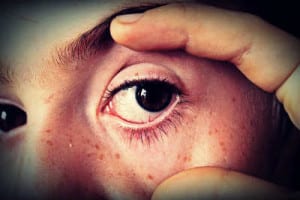Your cornea is the clear, dome-shaped surface that covers the front of your eye, and as the outermost layer, it’s designed to withstand minor injuries and abrasions. The cornea is highly sensitive, and if scratched can cause tearing and pain. But healthy cells quickly slide over to patch the injury before infection occurs that could affect your vision. If a scratch penetrates your cornea more deeply, it can result in greater pain, blurry vision and extreme light sensitivity. If you receive a deeper eye scratch, you should see your doctor. Injuries can cause scarring, resulting in a haze that can impair your vision. In this case, a corneal transplant may be needed.
Here are other common problems your cornea is built to withstand, but usually with help you can get from your trusted eye doctor by calling (352)237-8400 or toll-free (800)521-6028:

Allergic reaction to pollen is fairly common, causing your eyes to itch, burn, tear and turn red. Eye allergies can also be related to medications, wearing contact lenses, animal dander, cosmetics and other products we often use daily. Luckily, allergy symptoms are temporary and can be treated with products your doctor can recommend.
Pink Eye
Conjunctivitis is actually a group of diseases that cause swelling, itching, burning and redness of the protective membrane that lines the eyelids and covers areas of the white of the eye. Bacterial or viral infections, allergies, irritants, contact lens products and even eye drops can cause some form of conjunctivitis. The infection will usually clear without medical attention, but for some forms, you need to see a doctor for treatment. Infection may worsen and cause corneal inflammation and loss of vision.
Shingles
The same virus that causes chickenpox causes Herpes Zoster, which can reactivate later in life. The virus can travel to the head and neck, where it can affect the eyes, and in about 40% of outbreaks in these areas, the virus infects the cornea. You should see your doctor for most shingles outbreaks, especially involving the eyes. He can prescribe anti-viral treatment to reduce the risk of deeper cell infection, which could inflame and scar the cornea.
